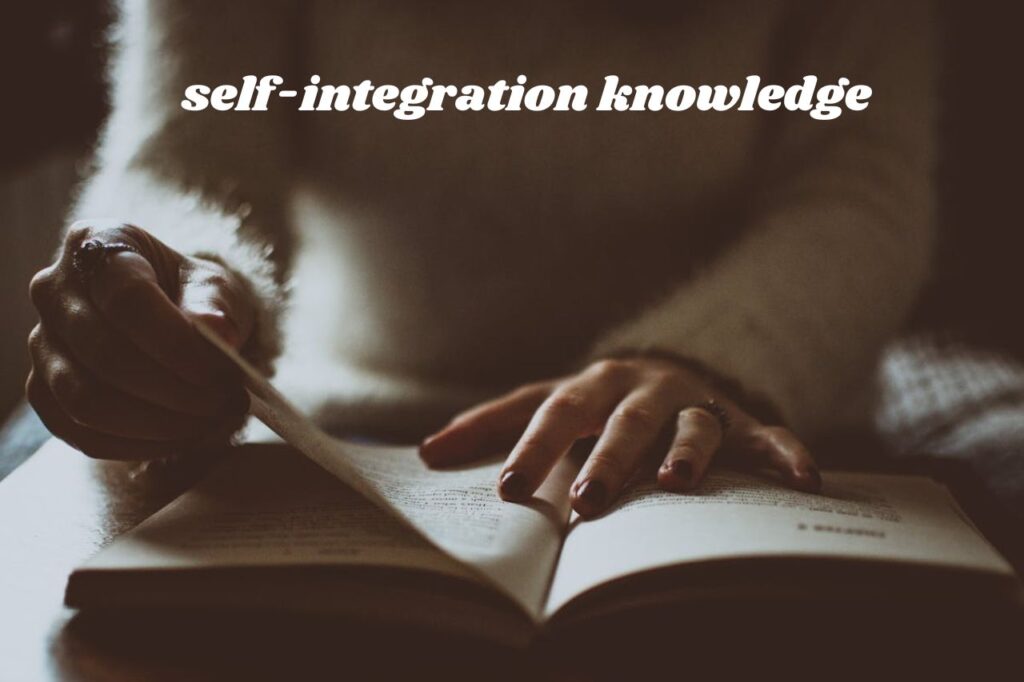In the process of individual development as a process in constant motion, there is one term that plays an important role – self-integration knowledge. This approach probes into the act of synthesizing parts of one’s character, feelings and opinions into a complete whole. Although it is hailed as being the best thing for self- growth and recognition of an alter ego, it is not without a hitch. This paper will look into self-integration knowledge – its advantages, disadvantages, and its impact on people’s lives.
What is Self-Integration knowledge?
As a core definition, self-integration knowledge is defined as the awareness and implementation of processes that lead to the integration of different aspects. It deals with how an individual attends to the inner world and composes a unity of response. It envelops multiple techniques of psychological, emotional as well as at times even spiritual sphere, to help one to be confident about oneself. For those individuals who want to develop themselves, self-integration knowledge comes as a logical framework. It is, however, a significantly detailed and challenging task that fours questions about the feasibility and usability of the model.
The Positive Side of Self-Integration Knowledge
1. Enhanced Self-Awareness
In addition, the self-integration knowledge which can promote the TPD’s self-integration development is helpful to operate and strengthen the TPD in the international market by raising the consciousness level of the TPD and enhancing the self-awareness of the TPD’s members and management team. If people can learn and accept the more outgoing, aggressive, more passive aspects of themselves, they can address each self-attribute and pinpoint their strong and weak spots as well as triggers. It more often results in better interpersonal relations and decision-making by the individual.
2. Emotional Resilience
Self-integration knowledge helps people understand how they should work on managing their feelings. The utilized practice involves the acceptance of negative thoughts and feelings without any emphasis of their negativity, which helps people become emotionally stronger and renders a minimum of negative effects.
3. Improved Authenticity
Implementing self-integration knowledge enhances the ability of people to accept themselves. Applying the two conflicting beliefs or prior experiences, people achieve improved relations and communications and thus a better life.
4. Holistic Growth
This practice of self-integration knowledge is not restricted to the mental and emotional parts, but also spiritual. It can be astonishing to the many practitioners who state that this way of thinking helps to define their place in the world.
Critique on Self Integration Knowledge
1. Complexity of the Process
One is the complexity of self-integration knowledge, which is a big minus of self-integration knowledge. The exercise entails self-analysis and constant work and may prove to be Herculean for some persons. Some people say that it does not apply to all cases or situations.
2. Time and Patience Required
It is important for such self-integration knowledge to take a long time and be patient. People cannot instantly see changes with treatment that often takes several weeks or sometimes months.
3. Emotional Challenges
It increases emotional strength. On the side the practice brings out emotions and conflicts that may have not come out as often. Some may find that the handling of such problems individually is rather challenging.
4. Limited Accessibility
The use of self-integration knowledge often means employing workshops, therapy, or self-help, and these are not available for any or all people. Its adoption is sometimes limited by a dearth of financial resources or credible sources.
The Effects of Self-Integration Knowledge
A. Small Success Stories that Change Lives
Self-integration knowledge has become a breakthrough for many circles. It has helped people to get over sickness and disease, social misfit, bad marriage and other past regrets. These success stories point to its real possibilities of transforming lives in a positive manner.
B. Challenges in Adoption
However, not everyone scores success in self-integration knowledge as we assumed earlier. Some have problems with the process itself, its intricacy, or lack the support they would like. This can only be done by having a proper environment or seeking professional help.
Some Guidelines to Strengthen the Benefits of Enterprise Self-Integration Knowledge
Start Small: Start with something simple that would not overwhelm a person to write or be mindful. Incrementalism is the way to go because it lays the groundwork for further study.
Seek Support: Speak to close friends, your therapist, or any support group that you may PHONE consulting with. This is very helpful because sharing your journey may give people ideas and even inspiration you may need.
Embrace the Process: Self integration knowledge means that one has to make some modifications and hence commitment is important. It’s nearly impossible to avoid volatility – so recognizing that and living with it is key.
Stay Consistent: Applying methods like the one provided and including standard relaxation/venting, guarantee sustained results and helpful development.
Conclusion: Is Self-Integration Knowledge Worth Exploring
As the Name suggests the concept of self- integration knowledge is one of the deepest ones providing a way towards making ourselves whole and finding ourselves. These are valuable skills in considering that honesty with self-leverages emotional strength and leads to higher level of self-fulfillment. However, with external factors, emotional factors, and the time demands it may not appeal to all.
Thus, only if the person is ready for the self-development and introduction search, self-integration knowledge will provide an opportunity for a great personal development. For others, easier or more readily available strategies may be more appropriate base lines. Thus, it should be a conscious decision to make this change for organizational success and personal readiness.
